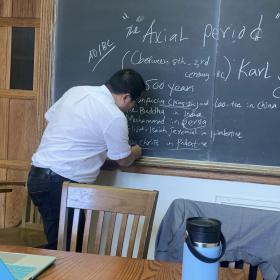Yale is expanding its Scholars at Risk program, which provides temporary professional appointments and a welcoming community on campus for academics, writers, artists, and activists who face persecution. These scholars come from countries where conflict or oppressive regimes prevent them from working safely.
Yale now hosts 14 scholars from eight countries across five schools. But bringing these scholars to campus can be challenging. Many face significant hurdles to leaving their countries of origin. Once here, they must adjust to new personal and professional trajectories.
“Given the many global crises that are endangering scholars around the world, Yale will build on its existing efforts to provide a safe haven for imperiled researchers, artists, and thinkers,” says Yale President Peter Salovey ’86 PhD. “New investments will strengthen our ability to bring at-risk scholars to campus so that they can safely continue their work in a supportive environment. Their presence here enriches our intellectual community and reminds us of the importance of academic freedom and free expression.”




Documenting Human Rights Abuses
Zahra is a visiting human rights fellow at the Orville H. Schell, Jr. Center for International Human Rights at Yale Law School. She moved to New Haven from Kabul, Afghanistan in 2022 to create a database of human rights violations committed by the Taliban.
“In Afghanistan, as a Hazara minority woman and a human rights activist, I lived under the shadow of constant threat from the Taliban,” Zahra says. “Our identity and work in human rights placed us in a perilous position, distinctly apart from the relative safety enjoyed by ordinary citizens. Every day was marked by the awareness that being an advocate for change and equality made us targets in our own homeland.”
Back in Afghanistan, while driving long distances to document human rights abuses all over country, Zahra had to completely cover her face and body, concealing her identity so as not to arise suspicion from Taliban members.
“It was a truly dangerous experience,” she says. “Now that I reflect on my life there, I realized how scared I was and how lucky I am to be safely allowed to work here at Yale.”
Zahra hopes her documentation of Taliban human rights abuses will shine a light on the organization’s disregard for international law, making it easier to prosecute them for violations.
“Being at Yale has given me access to valuable resources and has connected me with experts in the field,” Zahra says. “I’m so grateful to be here and proud to know that my work is going to make a difference for my people.”
She is also heartened by the expansion of Yale Scholars at Risk, which she sees as vital for academics and activists around the world.
“I believe it is our collective responsibility to consider scholars worldwide who need assistance,” Zahra says. “This is such an important way that Yale makes a difference and showcases its support for human rights.”




Unlocking a ‘Hidden History’
Moe, Henry Rice postdoctoral associate and lecturer in Southeast Asian studies, came to Yale in 2022 to write about Buddhist nationalism, conflict, resistance to the coup, and reconciliation in Myanmar, his homeland.
“As an ethnic and religious minority in Myanmar, I have firsthand experience with the violence and discrimination that I study,” Moe says. “In 1998, I was arrested because of who I am. If you criticize the government, you are seen as a criminal. Freedom of speech does not exist, which makes it impossible to research and write about these topics. Now, at Yale, I have academic freedom.”
Moe says his research has greatly benefitted from the resources at Yale, from colleagues and students to collections.
“When I first read the books on Myanmar in Yale’s libraries, I was stunned,” Moe says. “I was able to read many books that had been banned in Myanmar for criticizing the government. In Myanmar, we only learn one side of the story. But now, I am able to unlock the hidden history of Myanmar.”
On top of his research, Moe has taught multiple classes on religious nationalism and ethnic conflict in Southeast Asia for undergraduate and graduate students across Yale. His courses are the first in-depth classes on Myanmar offered in university history.
“In my courses, I share my experiences being oppressed as a religious minority in Buddhist nationalist Myanmar,” Moe says. “But we examine movements grounded in other religions that arise in different parts of the world. It’s fascinating to hear the diverse, global perspectives Yale students bring and seeing the work they produce comparing religious nationalism across religions and countries.”
Since coming to the United States, Moe has also become an activist, participating in public speaking and meeting with government leaders to discuss religious minorities in Myanmar.
“By bringing me here, Yale brought more than just one academic,” Moe says. “Yale brought the stories of my people, and amplified the voices of a community that deserves to be heard.”
Learn more about opportunities to support the Scholars at Risk program.
